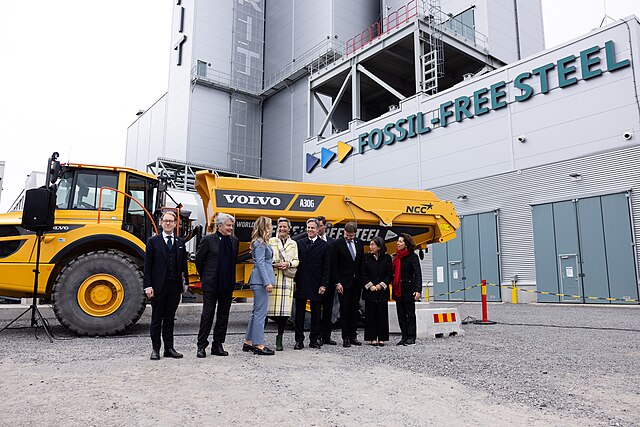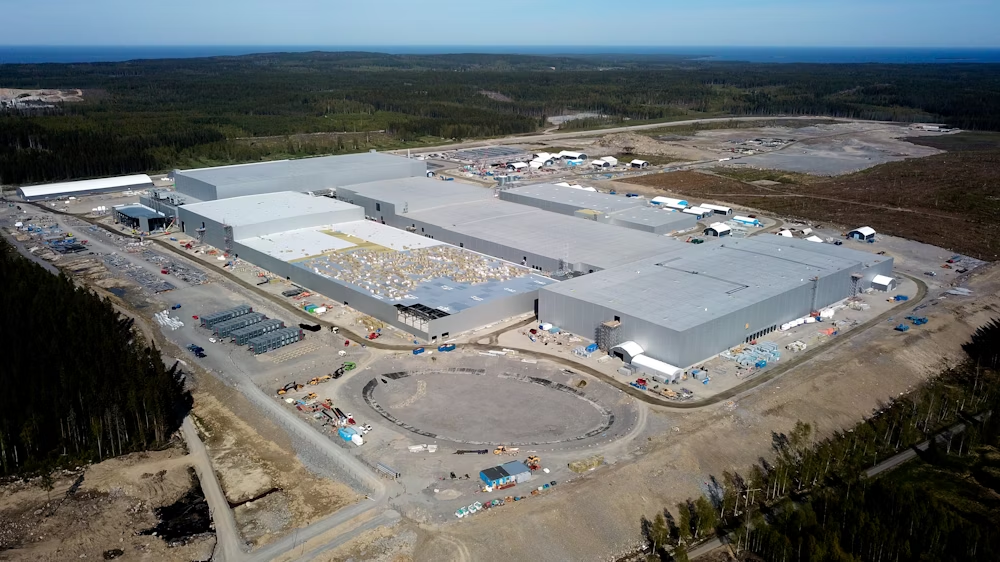“It has to work”.
That was the answer LKAB’s CEO Jan Moström gave in Ekot’s Saturday interview when he was asked how to solve the electricity supply for the fossil-free production of so-called green steel.
There was a time when the cheap and reliable hydropower of the Norrland rivers could attract large industrial projects to Norrland (northern Sweden), but those times are over. Swedish electricity is now primarily an asset for Europe, but even if every terawatt was kept domestically, it would not be enough: The operation of Hybrit and competitor H2 Green Steel alone is expected to require around 70 terawatt hours in 2040, which corresponds to half of Sweden’s total electricity consumption. Today, a modest 17 terawatt hours are available in Norrland.
But as said. No problem! Provided that it concerns “the green transition”, something that according to the laws of physics is impossible, and which could only be made somewhat less impossible if the Swedish households were disconnected from the electricity grid, can be met with a dash – and clinically freed from critical follow-up questions:
“It has to work”.
Try giving that answer when the bank asks how you intend to solve the financing of that home loan you applied for.
Certainly there have been voices crying in the wilderness. Exactly one year ago, the Scandinavian Policy Institute released the report Samhällsekonomiska effekter av att producera fossilfritt stål i norra Sverige (Socio-economic effects of producing fossil-free steel in northern Sweden), which stated that the sector is extremely competitive and that it may be difficult to reach profitability for the giant steel projects. Project leader for the report was Magnus Henrekson, professor of economics at the Institute for Business Research (IFN). He pointed out, among other things, that the technology that the Swedish producers of green steel rely on may soon be out of date.
– If there is some other technology in the world that turns out to be the best, then this will be a completely unsuccessful investment and a huge destruction of capital, Henrekson said in an interview with SVT Nyheter.
More or less simultaneously, Staffan Salén, entrepreneur and CEO of Salénia AB, wrote an article in Affärsvärlden where he asked a number of critical questions regarding the green steel and urged the government and ministries to “get in the driver’s seat”: Is there really a demand? Whose money is it? Is it a good deal? Where will the electricity come from? Does the state have a good track record in terms of huge investments? And can the project even be stopped..?
“If you don’t get answers to those questions, Hybrit will continue to move in the borderland between planned economy and almost religious fever dreams about electricity supply with a considerable risk that the government will get a new Stålverk 80 on its neck. Taxpayers’ money should be handled more carefully than that,” concluded Salén.
Did they listen to Salén? Or to others who have warned by pointing to the actual conditions? No. Of course not.
Because it has to work.
It is this attitude that has been mandated. Even when it has concerned projects where 800 billion of taxpayers’ money has been plowed down.
Nor did Prime Minister Ulf Kristersson call for any answers to Salén’s questions. Instead, he has repeated how important it is that the Swedish state “provides favorable conditions” by “creating laws and regulations”. In other words, the state must ensure that the companies can continue their march towards the edge of the cliff. All for the sake of the green transition. For Sweden to reach the climate goals for 2040. For Sweden to be at the forefront. For Sweden to be a world leader. Have you heard it before? It must be so. It will be so! How? No, don’t ask such difficult questions! You know what applies:
“It has to work”.

“Sweden must be a world leader.” Here, US Secretary of State Antony Blinken, US Trade Representative Katherine Tai, US Trade Minister Gina Raimondo and their counterparts from the EU and EU member states visit the Hybrit Steel Plant in Luleå, on May 30, 2023. Photo: Chuck Kennedy / Foreign Ministry’s photo / Wikimedia Commons
Not even research showing that fossil-free steel production is actually worse for the climate has slowed down the euphoria. “May we ask for the greatest possible silence…”
But then what always happens, sooner or later, happened. Reality intruded.
Northvolt is facing a restructuring and presumed bankruptcy, after multibillion-dollar credit guarantees from the National Debt Office, the European Investment Bank (EIB), where former economy minister Thomas Östros is the head, has issued favorable loans of over a billion dollars and another 240 million dollars in loans from Statliga Svensk exportkredit. H2 Green Steel changes its name to Stegra, to “clarify the ambition to speed up climate change” (believe it if you must). Svenska Kraftnät’s latest network development plan warns of the unreasonableness of both industry and the vehicle fleet now being electrified – and by force. There is no electricity to electrify with…
That the seesaw has tipped over becomes clear when Expressen publishes a debate article in which Henrik Jönsson, who repeatedly warned of “the green bubble”, is allowed to compare the green investments to “a cult”. And of course Jönsson is right. The involvement in the green transition has been religious and sect-like. No criticism has been allowed, the weak points and illogical reasoning have been ignored even though they were obvious.
At the same time, everyone who dared to ask prudent questions has been labelled as “climate deniers”, which has been the modern synonym for “heretics”.
But now “everyone” has suddenly sobered up. There was no market, after all. More and more car manufacturers are abandoning the previous goals of “one hundred percent fossil-free” to instead sell the gasoline- and diesel-powered vehicles that buyers want. The production of battery cells in Skellefteå in 2023 corresponded to only a few parts per thousand of the total, imagined capacity, which was revealed by Dagens Industri. Northvolt’s largest owner, the Volkswagen group, sends Northvolt hugs and kisses, but does not want to step in with financial support. The politicians don’t want that either (with the exception *drumroll* the Green Party, Miljöpartiet). Although they are still in to the green transition, there are now other things that have a higher priority. As financial support to Ukraine.
To be honest, things don’t look very bright for Northvolt. Or for Hybrit. Or for H2 Green… Sorry. Stegra. Or for that matter for Norrland, where politicians and residents of cities like Skellefteå, Boden and Gällivare spent years preparing for the thousands of new jobs that were promised. Or for the taxpayers, who have to stand there with a long nose when the bills have to be paid.
Because in the meeting between beautiful visions and grim reality, reality always wins. And there we are now, at the side of the road, watching the giant, green crash that we’ve seen approaching in slow motion for the last few years. Now what did they say?
“It has to work”. Or not.

